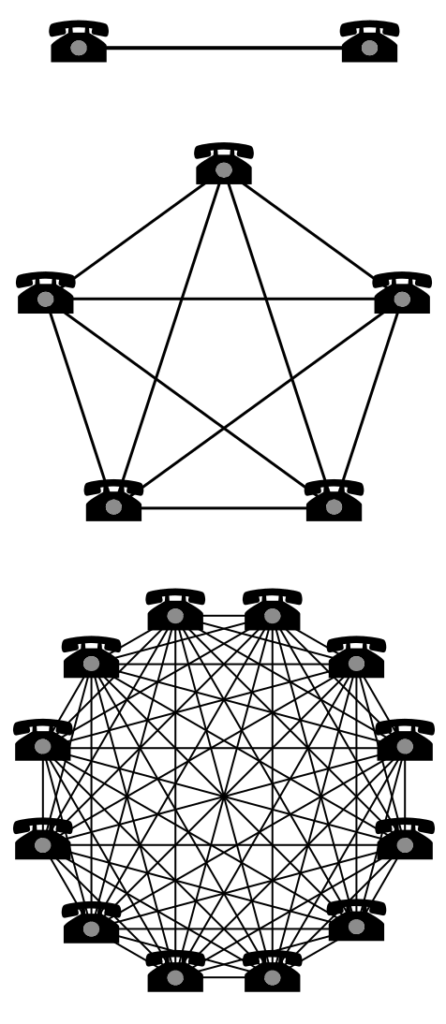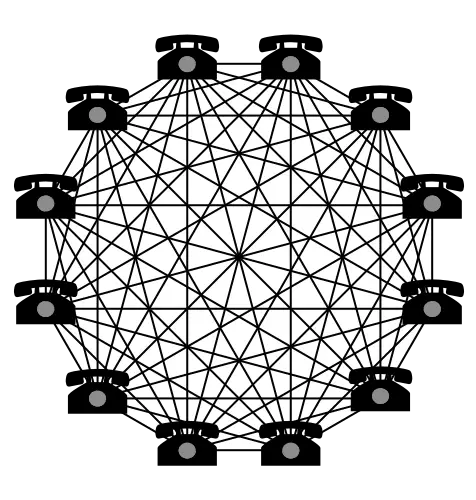
The network effect is a cool economic concept that explains how certain products or services gain value as more people use them. Basically, it’s like a snowball rolling down a hill – the more people hop on, the bigger and more powerful it gets.
The best part?
It’s everywhere around us!
A classic example of the network effect is the telephone. When only a few people had phones, they weren’t all that valuable. But as more people got connected, the phone became more and more useful. Today, it’s hard to imagine life without it!
What Are the Different Types of Network Effects?
Now, there are a few types of network effects that you should know about:
- Direct Network Effect: This happens when the value of a product or service directly increases as more people use it. Think social media – the more friends you have on Facebook, the more interesting and engaging it becomes.
- Indirect Network Effect: This is when the value of a product increases because of the growth of complementary products. For example, as more people bought iPhones, app developers flocked to create apps for the platform, making the iPhone even more useful.
- Two-sided Network Effect: This is where you have two distinct user groups that add value to each other. A good example is Uber – the more riders there are, the more drivers are attracted, and vice versa.
Examples of the Network Effect in Action
Alright, now that we’ve got a solid understanding of the network effect, let’s dive into some real-world examples:
- Social Media: As I mentioned earlier, Facebook is a prime example of the direct network effect. The more users it has, the more valuable it becomes. Same goes for other platforms like Twitter, Instagram, and Snapchat.
- Online Marketplaces: Think Amazon or eBay – the more buyers there are, the more sellers are attracted, which then leads to more buyers joining the platform. It’s a classic two-sided network effect.
- Streaming Services: Netflix, Hulu, and Disney+ all benefit from the network effect. As more people subscribe, the platforms can invest in more content, which in turn attracts more subscribers.
- Messaging Apps: WhatsApp, Telegram, and iMessage all rely on the direct network effect. The more people using the app, the more valuable it is for everyone to communicate.
The Dark Side of the Network Effect
Now, it’s not all sunshine and rainbows with the network effect. There are a few downsides to be aware of:
- Monopolies: Because of the network effect, companies can easily become dominant players in their industry, making it super hard for new competitors to enter the market. This can lead to less innovation and higher prices for consumers.
- Lock-In: Once a product or service has established a strong network effect, users might feel “locked in” to the platform. For example, it’s pretty tough to quit Facebook when all your friends and family are on it, right?
- Decreased Quality: In some cases, a company that benefits from the network effect might get complacent and not work as hard to improve their product, knowing that users are less likely to leave.
- Regulatory Capture: As governments slowly catch up to the problems that large networks can cause, they often introduce new legislation to curb their appetites. Unfrotunately for new potential entrants to these markets, the regulations are often immensely expensive to implement. This is why, counterintuitive, the incumbents themselves frequently lobby to have these enacted and enforced.
Reaping the Benefits of Network Effects
So, we’ve talked about how network effects can create some challenges, but they can also bring about some awesome benefits for companies and users alike. Let’s dig into how platforms can capitalize on the network effect to grow their user base and generate revenue.
Freemium Models
Many platforms adopt a “freemium” model, where the basic service is free, but users can pay for additional features. This approach encourages sign-ups, allowing the platform to grow and eventually monetize its user base.
Facebook is a perfect example of this. Initially, it was a simple, free social network. But then they introduced Facebook Ads, allowing the company to make money while still offering a free service to users and investing in improvements.
Two-sided platforms like Etsy can charge listing fees or commissions to sellers, while still offering a valuable marketplace for buyers.
Freemium gaming apps like Pokemon Go offer free gameplay, but provide the option for users to buy special items, event tickets, or avatar clothing. The more users play and invite their friends, the more opportunities there are for the developer to make money.
Network Effects: The Key to Startup Success?
According to venture capital firm NFX, network effects contributed to a whopping 70% of the value in tech in 2022. They studied 336 top tech companies valued at over $1 billion and found that network effects were at the core of successful tech startups.
Take Facebook Messenger as an example. It leverages the personal network effect by encouraging users to join when their friends do. Moreover, it taps into the personal utility network effect by enabling profound daily communication, like chatting with friends and family.
Wrapping Up
Network effects can be a double-edged sword – on one hand, they can lead to monopolies and lock-ins, but on the other hand, they enable companies to grow and innovate. By harnessing the power of network effects, platforms can find success and create value for both themselves and their users. It’s all about finding the right balance and staying focused on delivering an exceptional experience to keep those network effects rolling in!





